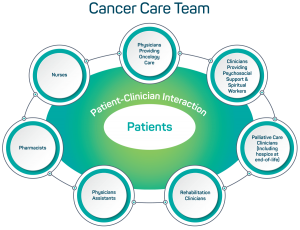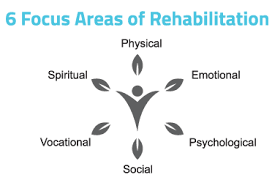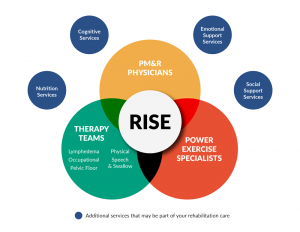The goal of cancer rehabilitation is to help you stay as active as possible and participate in work, family, and other life roles. It also help to lessen the side effects and symptoms of the cancer and its treatment. Rehabilitation aims to keep you as independent as possible and Improve your quality of life.
Cancer rehabilitation is given by trained rehabilitation professionals that you can work with during and after treatment.

Problems cancer rehabilitation can address
Physical problems: Cancer and cancer treatment can cause many different kinds of physical problems. Cancer rehabilitation can help with many of them, including Pain, Swelling, Weakness and loss of strength, Range of motion and flexibility issues. It also addresses issues like Decreased endurance,, Lymphedema, Balance issues and fear of falling ,Neuropathy, or numbness and tingling in hands or feet. there are also issues like Fatigue, Sexual dysfunction, Problems swallowing, Problems chewing food which needs to be taken care of.
Mobility problems: Mobility problems affect how a person moves around. Cancer rehabilitation can help if you have difficulty: Getting up off the floor, Getting out of a chair, Climbing stairs, Walking, Getting dressed, Showering
Cognitive problems: Cognitive problems are related to a person’s mental abilities. Difficulty in multitasking, Difficulty thinking clearly or mental fogginess and Memory trouble.

Types of cancer rehabilitation professionals
Different types of rehabilitation professionals may be part of cancer care team. Depending on the needs, patient may visit 1 or more of these specialists during cancer treatment and recovery.
Physical therapist: They specialize in helping people improve or restore mobility. They can also help reduce or eliminate pain. they work specifically with people who have cancer and cancer survivors.
Occupational therapist : OTs help maximize the function, comfort, and safety of patients during everyday living situations. This can include managing daily tasks, such as bathing and dressing. The plan is based on the layout of a home, school, or work place. OTs also teach ways to reduce the effort needed for certain tasks. This helps people manage fatigue and other limitations.
Speech pathologist : SLPs specialize in communication and swallowing disorders. They can help people maintain their swallowing and eating ability after radiation therapy and chemotherapy for head and neck cancers. An SLP may also help people with cognitive problems improve their memory and organization skills.
Lymphedema therapist. Lymphedema therapists evaluate and treat lymphedema. They focus on reducing swelling and controlling pain. They often use techniques such as compression garments, specialized massages, bandaging methods, and exercises.
Cognitive psychologist. Cognitive psychologists, also called neuropsychologists, are experts in understanding how behavior relates to brain function. They often help manage “chemobrain,” a word used to describe the cognitive problems that people with cancer often face during and after cancer treatment.
Vocational counselor. Vocational counselors support people in returning to work during or after cancer treatment. They can help a person learn how to do daily job-related tasks more easily.
Exercise physiologist. Exercise physiologists analyze a person’s fitness to help them improve function. Using stress tests and other tools, they evaluate cardiovascular function and metabolism. They can also design fitness plans that meet the needs of people during and after cancer treatment. Learn more about exercise and cancer.

When to get cancer rehabilitation
You can play a proactive role in your medical care. Talk with your health care team about cancer rehabilitation any time you notice a change in symptoms that makes you less active
Ask yourself:
Am I having more trouble getting around?
Am I having pain, weakness, or other symptoms?
Am I having trouble thinking clearly?
You can also ask your health care team about seeing a cancer rehabilitation professional before you start cancer treatment. The rehabilitation professional can assess your strength, mobility, and activities before problems start. You can then be monitored throughout treatment and beyond to catch issues before they become serious. This approach can increase your quality of life. And it can reduce symptoms and problems that can impact your work and home life.

